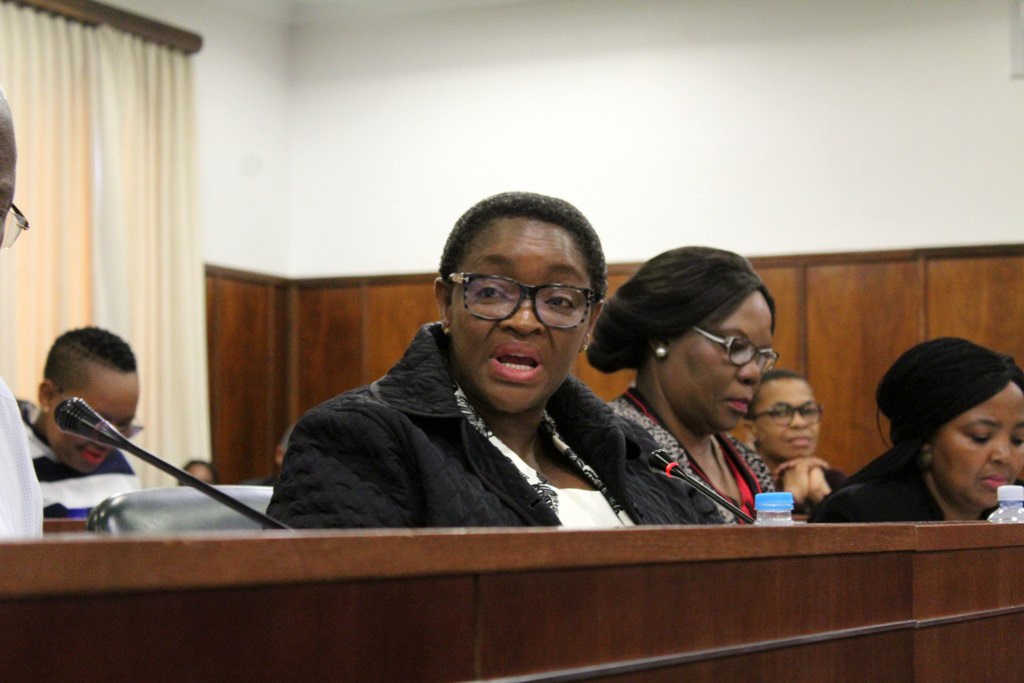
Parliament has given the social welfare agency and the South African Post Office (Sapo) just over 24 hours to resolve the impasse over how social grants will be paid from April next year.
The two entities were at odds during a heated meeting of Parliament’s public finance watchdog (Scopa) and social development oversight committees with one adamant that the post office does not have the capacity to disburse social grants when Cash Paymaster Services’ contract comes to an end in April next year.
Sapo chief executive Mark Barnes argued that the state entity is capable.
This is contrary to the South Africa Social Security Agency’s (Sassa) announcement on Monday that the Sapo’s capability to carry out the disbursement of social grants was too limited.
Social Development Minister Bathabile Dlamini told journalists in East London on Monday that Sassa will use an open tender process to find providers for three services as Sapo would not cope with such.
As a result, Sassa will start a tender process on Friday looking for a service provider or providers for those three services.
“This procurement process will be concluded in the last week of February 2018 and an award will be announced,” she said.
The post office has been awarded a contract to provide “an integrated payment system” that entails a payment platform development, beneficiary biometric enrolment and the biometric proof of life.
But it would not provide banking services, card production and cash payments at pay points.
It was also disqualified because it does not have the capacity to issue bank cards and has no banking licence, according to what Sassa’s acting chief executive Pearl Bhengu told the joint-parliamentary committees last Tuesday.
The post office disagreed. Its chairperson, Comfort Ngidi, labelled these as “misconceptions which have been created” reminding the meeting that the post office had disbursed social grants before – albeit partly.
“As we all know, Sapo previously paid social grants, so you can’t test us on whether we can do it or not do it because we have already been tested.”
Ngidi insists that the post office was appointed as service aggregator to pay social grants by the former Sassa CEO, Thokozani Magwaza, who resigned from the agency in July.
“From our point of view that letter is valid and still holds water. It was after the advice of the Treasury department and from a legal point of view, we see that letter as appointment,” he said while hinting the post office will go the legal route if it doesn’t get the contract to disburse grants.
Ngidi alos claimed that Sapo aced an assessment done by Sassa in terms of the Council for Scientific and Industrial Research (CSIR) report where it scored over 90%.
“In our view we are ready to do what we are asked to do ... [and] you don’t need a licence, we have been doing it already,” Ngidi said.
In September, Sassa contracted the CSIR to undertake a due diligence inquiry into the capacity of Sapo to pay more than R140bn in social grants to about 17 million beneficiaries annually.
Ngidi was backed by his chief executive Barnes, who argued that the post office can produce and deliver banking cards; that as far as cash payments at pay points go, it could provide coverage that is greater than or equal to anybody else’s.
“We have got 2500 points of presentation which no one else has and whatever your distribution capability is, we can enhance that by that many points of payment,” he said.
Barnes said the payment of cash in the deep rural areas was most likely to be done by cash in transit companies who are specialists, especially when it relates to security.
The Post Bank is a designated participant in the national payments system, performing own interbank transaction clearing, providing all grant recipients full interoperable access to all ATMs, retailers and POS purchases, he added.
And like any other auto bank card, Post Bank is in a position to provide that service.
Barnes said they had applied to the SA Reserve Bank for registration as a bank in June.
The primary purpose for applying for a banking licence is to take deposits from the public, something they are already doing in terms of the Post Bank Act, but this [application] was to provide more fully fledged banking services.
“It needs to be made clear that the payment of social grants is a transactional service, it’s not a risk lending service, it is simply the accommodation of cash flows.”
He said Post Bank was also able to settle banking transactions, as Standard Bank was their clearing bank and therefore there was no substance to the notion that they were not a merchant.
Barnes argued that Post Bank should be tested on a systems capability not a credit or risk capability. He boasted that Post Bank has 5.7million customer accounts, R5 billion of their money on deposit and R8 billion in cash and near cash instruments with banks and Treasury.
But it was his argument to keep this service within the state that seemed more compelling.
“Our primary purpose in wishing to assist Sassa is to avoid the duplication of investment wherein in the intergovernmental framework you invest in one another’s capability and you build an asset for the state,” said Barnes.
“When you outsource such a capability you create a dependency on the private sector. We would argue for creating an asset in the state. The entire value chain between organs of state can be properly monitored and managed jointly with Sapo and Sassa during the build, operate and transfer period while it will be easy to transfer skills and functionality back to Sassa,” he said.
Barnes said their offer was affordable and monies transferred to the post office remain with the state and if it needs be, they were prepared to “take instruction” on the price.
Minister Dlamini, who made a rare appearance before the joint committees, alongside her counterpart from telecommunications, Siyabonga Cwele, protested that she was hearing some of what Barnes was saying for the first time and they were never part of the post office’s response to Sassa. MPs were not interested. They wanted a solution to the deadlock.
“I don’t think that we can divorce ourselves from this, because if we don’t insist that there is a deadlock breaking mechanism and a year down the line, we find that there were duplicate payments or unnecessary expenses, then clearly as Parliament we would have failed in our oversight responsibility because we couldn’t after today argue that we were not aware of it,” said ANC MP Vincent Smith.
Committee chairperson Themba Godi agreed, saying the matter had to be “laid to rest one way or the other”.
Dlamini, Cwele, their teams and National Treasury were instructed to find the breakthrough and report back to Parliament at 6pm today.




 Publications
Publications
 Partners
Partners








